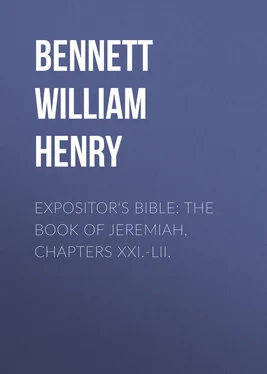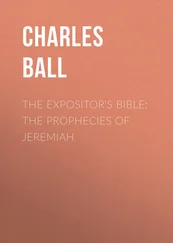William Bennett - Expositor's Bible - The Book of Jeremiah, Chapters XXI.-LII.
Здесь есть возможность читать онлайн «William Bennett - Expositor's Bible - The Book of Jeremiah, Chapters XXI.-LII.» — ознакомительный отрывок электронной книги совершенно бесплатно, а после прочтения отрывка купить полную версию. В некоторых случаях можно слушать аудио, скачать через торрент в формате fb2 и присутствует краткое содержание. Издательство: Иностранный паблик, Жанр: foreign_religion, foreign_antique, foreign_prose, на английском языке. Описание произведения, (предисловие) а так же отзывы посетителей доступны на портале библиотеки ЛибКат.
- Название:Expositor's Bible: The Book of Jeremiah, Chapters XXI.-LII.
- Автор:
- Издательство:Иностранный паблик
- Жанр:
- Год:неизвестен
- ISBN:нет данных
- Рейтинг книги:5 / 5. Голосов: 1
-
Избранное:Добавить в избранное
- Отзывы:
-
Ваша оценка:
- 100
- 1
- 2
- 3
- 4
- 5
Expositor's Bible: The Book of Jeremiah, Chapters XXI.-LII.: краткое содержание, описание и аннотация
Предлагаем к чтению аннотацию, описание, краткое содержание или предисловие (зависит от того, что написал сам автор книги «Expositor's Bible: The Book of Jeremiah, Chapters XXI.-LII.»). Если вы не нашли необходимую информацию о книге — напишите в комментариях, мы постараемся отыскать её.
Expositor's Bible: The Book of Jeremiah, Chapters XXI.-LII. — читать онлайн ознакомительный отрывок
Ниже представлен текст книги, разбитый по страницам. Система сохранения места последней прочитанной страницы, позволяет с удобством читать онлайн бесплатно книгу «Expositor's Bible: The Book of Jeremiah, Chapters XXI.-LII.», без необходимости каждый раз заново искать на чём Вы остановились. Поставьте закладку, и сможете в любой момент перейти на страницу, на которой закончили чтение.
Интервал:
Закладка:
The prophet was to stand in the court of the Temple and repeat once more to the Jews his message of warning and judgment, "all that I have charged thee to speak unto them, thou shalt not keep back a single word." The substance of this address is found in the various prophecies which expose the sin and predict the ruin of Judah. They have been dealt with in the former volume 11 11 See especially the exposition of chaps. vii. – x., which are often supposed to be a reproduction of Jeremiah's utterance on this occasion.
on Jeremiah in this series, and are also referred to in Book III.
According to the universal principle of Hebrew prophecy, the predictions of ruin were conditional; they were still coupled with the offer of pardon to repentance, and Jehovah did not forbid his prophet to cherish a lingering hope that "perchance they may hearken and turn every one from his evil way, so that I may repent Me of the evil I purpose to inflict upon them because of the evil of their doings." Probably the phrase "every one from his evil way" is primarily collective rather than individual, and is intended to describe a national reformation, which would embrace all the individual citizens; but the actual words suggest another truth, which must also have been in Jeremiah's mind. The nation is, after all, an aggregate of men and women; there can be no national reformation, except through the repentance and amendment of individuals.
Jeremiah's audience, it must be observed, consisted of worshippers on the way to the Temple, and would correspond to an ordinary congregation of church-goers, rather than to the casual crowd gathered round a street preacher, or to the throngs of miners and labourers who listened to Whitfield and Wesley. As an acknowledged prophet, he was well within his rights in expecting a hearing from the attendants at the feast, and men would be curious to see and hear one who had been the dominant influence in Judah during the reign of Josiah. Moreover, in the absence of evening newspapers and shop-windows, a prophet was too exciting a distraction to be lightly neglected. From Jehovah's charge to speak all that He had commanded him to speak and not to keep back a word, we may assume that Jeremiah's discourse was long: it was also avowedly an old sermon 12 12 The Hebrew apparently implies that the discourse was a repetition of former prophecies.
; most of his audience had heard it before, all of them were quite familiar with its main topics. They listened in the various moods of a modern congregation "sitting under" a distinguished preacher. Jeremiah's friends and disciples welcomed the ideas and phrases that had become part of their spiritual life. Many enjoyed the speaker's earnestness and eloquence, without troubling themselves about the ideas at all. There was nothing specially startling about the well-known threats and warnings; they had become
"A tale of little meaning tho' the words were strong."
Men hardened their hearts against inspired prophets as easily as they do against the most pathetic appeals of modern evangelists. Mingled with the crowd were Jeremiah's professional rivals, who detested both him and his teaching – priests who regarded him as a traitor to his own caste, prophets who envied his superior gifts and his force of passionate feeling. To these almost every word he uttered was offensive, but for a while there was nothing that roused them to very vehement anger. He was allowed to finish what he had to say, "to make an end of speaking all that Jehovah had commanded him." But in this peroration he had insisted on a subject that stung the indifferent into resentment and roused the priests and prophets to fury.
"Go ye now unto My place which was in Shiloh, where I caused My name to dwell at the first, and see what I did to it for the wickedness of My people Israel. And now, because ye have done all these works, saith Jehovah, and I spake unto you, rising up early and speaking, but ye heard not; and I called you, but ye answered not: therefore will I do unto the house, that is called by My name, wherein ye trust, and unto the place which I gave to you and to your fathers, as I have done to Shiloh." 13 13 vii. 12-14. Even if chaps. vii. – x. are not a report of Jeremiah's discourse on this occasion, the few lines in xxvi. are evidently a mere summary, and vii. will best indicate the substance of his utterance. The verses quoted occur towards the beginning of vii. – x., but from the emphatic reference to Shiloh in the brief abstract in xxvi., Jeremiah must have dwelt on this topic, and the fact that the outburst followed his conclusion suggests that he reserved this subject for his peroration.
The Ephraimite sanctuary of Shiloh, long the home of the Ark and its priesthood, had been overthrown in some national catastrophe. Apparently when it was destroyed it was no mere tent, but a substantial building of stone, and its ruins remained as a permanent monument of the fugitive glory of even the most sacred shrine.
The very presence of his audience in the place where they were met showed their reverence for the Temple: the priests were naturally devotees of their own shrine; of the prophets Jeremiah himself had said, "The prophets prophesy falsely, and the priests rule in accordance with their teaching." 14 14 v. 31.
Can we wonder that "the priests and the prophets and all the people laid hold on him, saying, Thou shalt surely die"? For the moment there was an appearance of religious unity in Jerusalem; the priests, the prophets, and the pious laity on one side, and only the solitary heretic on the other. It was, though on a small scale, as if the obnoxious teaching of some nineteenth-century prophet of God had given an unexpected stimulus to the movement for Christian reunion; as if cardinals and bishops, chairmen of unions, presidents of conferences, moderators of assemblies, with great preachers and distinguished laymen, united to hold monster meetings and denounce the Divine message as heresy and blasphemy. In like manner Pharisees, Sadducees, and Herodians found a basis of common action in their hatred of Christ, and Pilate and Herod were reconciled by His cross.
Meanwhile the crowd was increasing: new worshippers were arriving, and others as they left the Temple were attracted to the scene of the disturbance. Doubtless too the mob, always at the service of persecutors, hurried up in hope of finding opportunities for mischief and violence. Some six and a half centuries later, history repeated itself on the same spot, when the Asiatic Jews saw Paul in the Temple and "laid hands on him, crying out, Men of Israel, help: This is the man, that teacheth all men everywhere against the people and the law and this place, … and all the city was moved, and the people ran together and laid hold on Paul." 15 15 Acts xxi. 27-30.
Our narrative, as it stands, is apparently incomplete: we find Jeremiah before the tribunal of the princes, but we are not told how he came there; whether the civil authorities intervened to protect him, as Claudius Lysias came down with his soldiers and centurions and rescued Paul, or whether Jeremiah's enemies observed legal forms, as Annas and Caiaphas did when they arrested Christ. But, in any case, "the princes of Judah, when they heard these things, came up from the palace into the Temple, and took their seats as judges at the entry of the new gate of the Temple." The "princes of Judah" play a conspicuous part in the last period of the Jewish monarchy: we have little definite information about them, and are left to conjecture that they were an aristocratic oligarchy or an official clique, or both; but it is clear that they were a dominant force in the state, with recognised constitutional status, and that they often controlled the king himself. We are also ignorant as to the "new gate"; it may possibly be the upper gate built by Jotham 16 16 2 Kings xv. 35.
about a hundred and fifty years earlier.
Интервал:
Закладка:
Похожие книги на «Expositor's Bible: The Book of Jeremiah, Chapters XXI.-LII.»
Представляем Вашему вниманию похожие книги на «Expositor's Bible: The Book of Jeremiah, Chapters XXI.-LII.» списком для выбора. Мы отобрали схожую по названию и смыслу литературу в надежде предоставить читателям больше вариантов отыскать новые, интересные, ещё непрочитанные произведения.
Обсуждение, отзывы о книге «Expositor's Bible: The Book of Jeremiah, Chapters XXI.-LII.» и просто собственные мнения читателей. Оставьте ваши комментарии, напишите, что Вы думаете о произведении, его смысле или главных героях. Укажите что конкретно понравилось, а что нет, и почему Вы так считаете.












